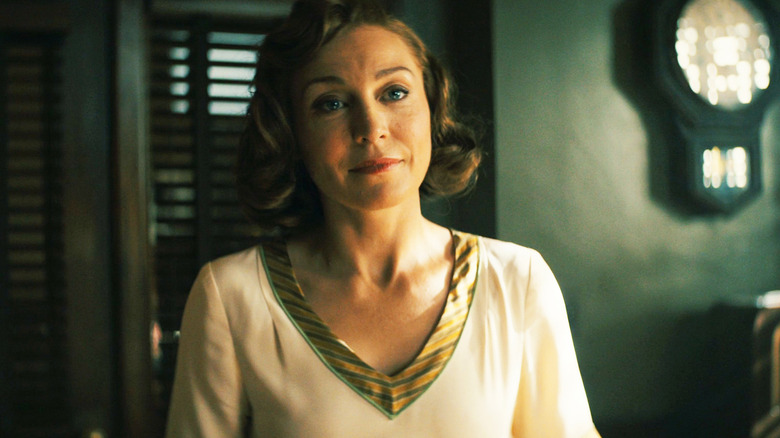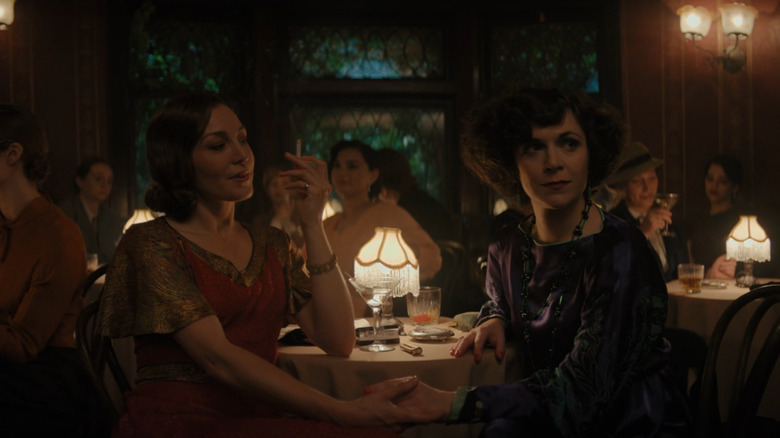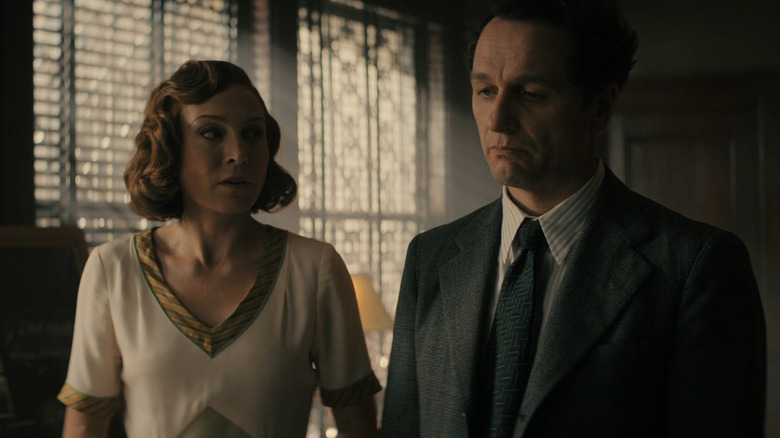Juliet Rylance Knew Perry Mason Season 2 Would Set High Stakes For Della Street
Since his first appearance in Erle Stanley Gardner's 1933 book "The Case of the Velvet Claws," Perry Mason has remained consistently popular due to several film, TV, and radio adaptations. But when HBO decided to reboot the private investigator turned criminal defense lawyer for the 21st century, they naturally put a new spin on the character and those around him. The hardboiled, pulpy debut season of "Perry Mason" ended with Matthew Rhys' P.I. embracing the role of a lawyer for which he's so well known, accompanied by his new lead investigator Paul Drake (Chris Chalk) and legal assistant turned co-counsel Della Street (Juliet Rylance).
But rather than Drake being the droll P.I. of previous iterations, the HBO show's version is a conflicted and embattled former LAPD street cop, struggling to support his family and navigate the treacherous landscape of a deeply racist 1930s Los Angeles. And whereas the famous 1950s/60s "Perry Mason" TV show played on the "will they, won't they" romantic tension between Barbara Hale's Street and Raymond Burr's Mason, Rylance's version is a closeted lesbian with ambitions to become a lawyer in her own right. That means her character experiences her own unique struggle to balance her fearsome and determined nature with having to hide such a big part of who she is.
In that way, the "Perry Mason" writers have utilized the societal issues of the time to create some palpable dramatic tension throughout the show. Whereas the first season explored Mason's own struggles with being a war vet and his efforts to keep his family farm, season 2 has thus far embraced the experiences and hardships faced by those around him. And for Rylance, raising the stakes for her character was a welcome change.
LA's history informed Della's story
In "Perry Mason" season 1, we learn that Juliet Rylance's Della Street is a lesbian, but season 2 explores her experience more deeply. Street makes no secret of her desire to become a partner alongside Matthew Rhys' Perry Mason, telling him in the season 1 finale that once she completes her lawyer training she expects the Mason & Associates practice to become Mason & Street.
All of which speak to her ambitious and driven nature. But the customs and laws of 1930s LA mean she has to remain more discreet when it comes to her sexuality. That tension between her enterprising personality and the fact she's required to hide a big part of herself not only makes for compelling TV, but it was also very much the reality for so many queer citizens of the city of Angels.
As part of a historic context statement prepared for the city of LA in 2023, SurveyLA noted how "the LGBTQ community blossomed in late 1920s and early 1930s Los Angeles, and Hollywood in particular, as the population of the region soared." But a backlash soon grew as the Great Depression hit and "the reactionary response to the fear and tension of the period was the return of a staunch belief that men should be men, and women should be women."
Naturally, that meant the LGBTQ community was targeted as "many Americans blamed their hard times on the excesses of the 1920s, particularly the hedonistic culture they associated with being gay or bisexual." That's aside from the numerous laws that made being anything other than straight a literal crime. It's this shameful history that's dramatized in "Perry Mason" season 2, but which also makes for some uplifting moments as Street explores the hidden LGBTQ community in her city.
An enjoyable tension
In season 2, Della Street meets Jen Tullock's Anita St. Pierre –- one of many season 2 recruits — who helps Street embrace her sexuality by taking her to lesbian clubs and whisking her away on romantic getaways. For Juliet Rylance, exploring the tension between the freedom Anita represents and the need for Della to remain closeted in her daily life was an exciting challenge. As she told Collider:
"The reality then, at that time, is that if [Street] had been found out to have been gay, she could have been arrested, put in jail, and lost her job and any chance to ever practice law again. So, the stakes are really high. And then, there's all the freedom that Anita St. Pierre brings, with this world of being a writer in television. There are a lot of unsaid rules and clubs and places for people to meet, and all of that is hidden to Della, in many ways, until it's gradually revealed. For someone so forceful to feel voiceless and hidden, it creates such a strange tension in a person, and I found that really enjoyable to play."
As Della ventures out into the community revealed by Anita, she further risks her burgeoning career as a lawyer. Yet there's an undeniably positive aspect to the series that develops out of Della's adventures with Anita, which Rylance herself picked up on. She added:
"There's that wonderful scene that [showrunners] Jack [Amiel] and Michael [Begler] wrote, when Anita finally persuades Della to come to that club and it's the first time you see all these LGBTQ couples, dressed however they wanna dress. Seeing a place like that, that exists, it's such a moment for Della to know there are people like her out there and she can do that."


